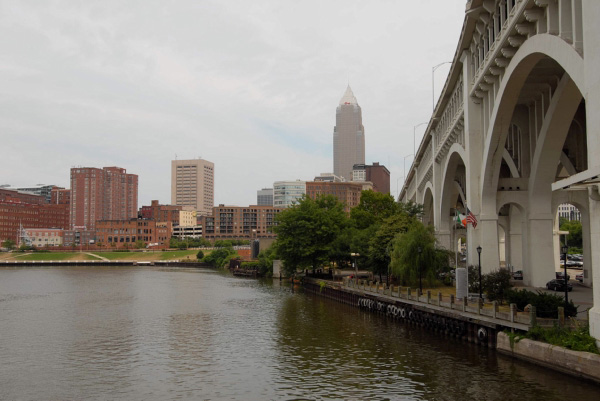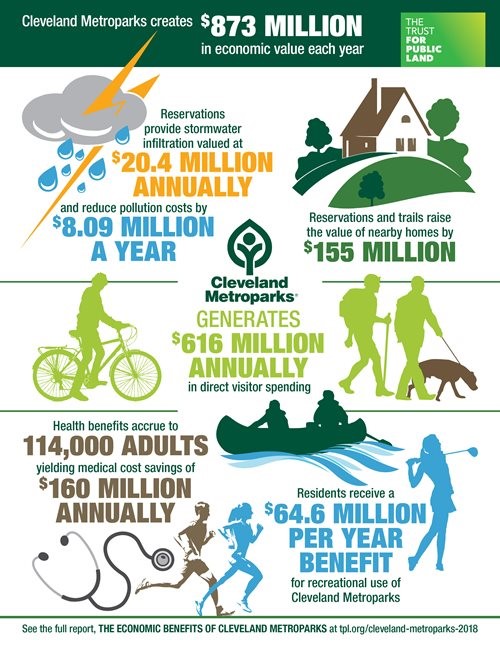Last updated on February 14th, 2024

The historic city of Cleveland, Ohio is situated on the shores of Lake Erie and the banks of the Cuyahoga River. Like many major metropolitan areas throughout the United States, it is facing multiple challenges simultaneously. The climate crisis, loss of nature, and long-standing structural inequities threaten residents, the city as a whole, and the natural ecosystem. To combat these growing crises, The Trust for Public Land is working with government and community partners to address climate and park equity through a people and data-driven approach.
Parks are not perks — they are essential infrastructure for healthy, connected, equitable, resilient, and empowered communities.
The Trust for Public Land and its partners are using cutting edge data and science to support resilient planning efforts, economic benefit studies to demonstrate the value of increasing investments in parks and nature-based climate solutions, and deep community engagement to transform neighborhoods and deliver improved climate, health and equity outcomes.
Climate Smart Cities – Cleveland. With funding from U.S. EPA and NOAA, The Trust for Public Land partnered with the City of Cleveland to support resiliency goals using the power of parks and green infrastructure. The project team, made up of city officials and community-based organizations, developed a publicly available web mapping decision support tool that pinpoints where investments in parks and green infrastructure are most needed to improve local resilience and equity. The tool brings together environment, land use, health and equity data to enable multi-benefit analysis. The tool shows, down to the parcel level, where investments in parks and green infrastructure can simultaneously:
- Cool extreme heat;
- Absorb stormwater runoff;
- Protect against lake and river flooding; and
- Connect neighborhoods to reduce transportation emissions.
But identifying where park and other nature-based investments are needed to build local climate, health, and equity outcomes was only the first step. City officials and others wanted to know the value of parks.

Economic Benefits of Cleveland Metroparks. Economists with The Trust for Public Land conducted a study to evaluate the economic benefits provided by Cleveland Metroparks – the manager of the regional park system. The findings were astounding. The existing park system creates $873 million in economic value each year (figure1). That includes the over $20 million in stormwater infiltration and $8 million in reduced air pollution value a year. Supporting the Cleveland Metroparks system values, further analysis using iTree Landscape shows the tree canopy found throughout the city, including on parks and public land, stores approximately 171,000 tons of carbon (valued at nearly $30 million) and sequesters nearly 4,500 tons annually (valued at $767,000 per year).
Park Equity +: Building on the Climate Smart Cities partnership and the valuation of Cleveland Metroparks, economists with The Trust for Public Land went one step further and identified the five highest-priority neighborhoods for park development in the city and then projected the likely economic benefits of future investment. New and improved parks in these five neighborhoods would bring an additional 10,600 individuals, including 2,850 children, who do not currently have easy access to a park, within a 10-minute walk of a park. Park investments in these neighborhoods are also expected to produce an estimated $10.1 million in economic benefits over the next ten years. Click here to learn more and view the research summaries by neighborhood.
This work continues to build momentum for increased investment in parks and green space. In 2021, Cleveland became one of the first seven cities to participate in the Urban Drawdown Initiative – an effort to quantify the carbon capture potential of urban greening and improved land management practices.
While there is still a lot of work to be done, these planning efforts and economic valuation studies have laid the groundwork for transformational urban greening that can draw down carbon, improve resilience, and help address long-standing inequities for the community.
To learn more about The Trust for Public Land’s work in Cleveland visit https://www.tpl.org/our-work/parks-people-cleveland and to learn more about The Trust for Public Land’s national climate, health, and equity commitments, visit: https://www.tpl.org/our-commitments.
Taj Schottland is the Senior Climate Program Manager at The Trust for Public Land.
